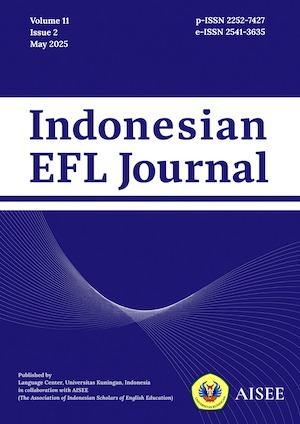USING GIBBS’ REFLECTIVE CYCLE IN MAKING REFLECTIONS OF LITERARY ANALYSIS
Abstract
In English as Foreign Language (EFL) classroom context, it is compulsory for the students to make reflections of literary works. The current study is aimed at examining how the students implement Gibbs’ reflective cycle in making reflections of literary analysis. The qualitative study employed a document analysis upon the students’ reflection artefacts. The students’ reflections are their responses to a short story written by Amy Tan. The findings of the study revealed that Gibbs’ reflective cycle is a good framework to be used by the students in writing reflections upon literary works they are working on. The well-structured framework of writing reflection helped the students explore the literary work deeply, since the reflective cycle accommodates important aspects that can be explored from the literary work by the students. It can be concluded from this study that among the models of reflective writing developed by Kolb, Johnson, and Gibbs, the latest model is considered the most suitable to be used in literary classroom since its well-structured model enables the students to write better reflections of literary works.
Keywords: reflective writing; Gibbs’ reflective cycle framework; literary works; literary analysis.References
Bubnys, R. & Žy¬džiū¬nai¬tė, V., (2010). Reflective learning models in the context of higher education: Concept analysis. Problems of Education in 21st Century. 20 (1), 58-66.
Choo, Y.B., Abdullah, T., Nawi, A.M. (2018). Learn to teach: Patterns of reflective practice in written journal. LSP International Journal, 5(2), 50.
Febriani, R. B. (2019). The students’ reflective writing manifestation of reader-response literary analysis. Journal of English Education, Literature, and Culture. 4(1). 35-44
Gibbs, G. (1988). Learning by doing: A guide to teaching and learning methods. Oxford: Oxford Further Education Unit
Glencoe. (2010). Literature: Teacher edition. New York: McGraw-Hill Companies, Inc.
Hegarty, B. (2011). A framework to guide professional learning and reflective practice. University of Wollongong Thesis Collection. Wollongong: University of Wollongong.
Holder, N.A.K., Sim, Z.L., Foong, C.C., Pallath, V. (2019). Developing a reflection guiding tool for underperforming medical students: An action research project. Tuning Journal for Higher Education, 7(1), 115-163
Hussein, H. (2018). Examining the effects of reflective journals on students’ growth mindset: A case study of tertiary level EFL students in the United Arab Emirates. IAFOR Journal of Education, 6(2), 33-50.
Johns, C. (1993). Achieving effective work as a professional activity in towards advanced nursing practice (Ch11) Eds: Schober, JE., and Hinchliff SM., Arnold.
Lazar, G. (1993). Literature and language teaching. Cambridge: Cambridge University Press.
Middleton, R. (2017). Critical reflection on practice development: The struggle of a practice developer. International Practice Development Journal, 7(1), 41-46.
Roberts, E.V. & Jacobs. H.E., (2004). Literature: An introduction to reading and writing. New Jersey: Pearson Prentice Hall.
Rosenblatt, L. (1988). Writing and reading the transactional theory. Wahington DC: The National Institute of Education.
Ross, N. (2011). Reflective writing: An approach to developing critical thinking & proficient writing. New York: United States Military Academy.
Sekarwinahyu, M., Rustaman, N., Widodo, A., Riandi, R. (2019). Problems based learning skills and reflection skills of biology education students through the problem based online tutorial. Journal of Physics: Conference Series 1280 (2019) 032004
Tan, A. (2006) The joy luck club. New York: Penguin Print
Van, T.T.M., (2009). The relevance of literary analysis to teaching literature in The EFL classroom. English Teaching Forum, 47(3), 2-9.
Wain, A. (2017), Learning through reflection, British Journal of Midwifery, 25(10). 662-666
Watton, P., Collings, J., Moon, J., (2001). Reflective writing: Guidance notes for students. England: Exeter University
Widyahening, E. T. & Wardhana, N. E. (2016). Literary works and character education. International Journal of Language and Literature, 4(1) 176-180.









